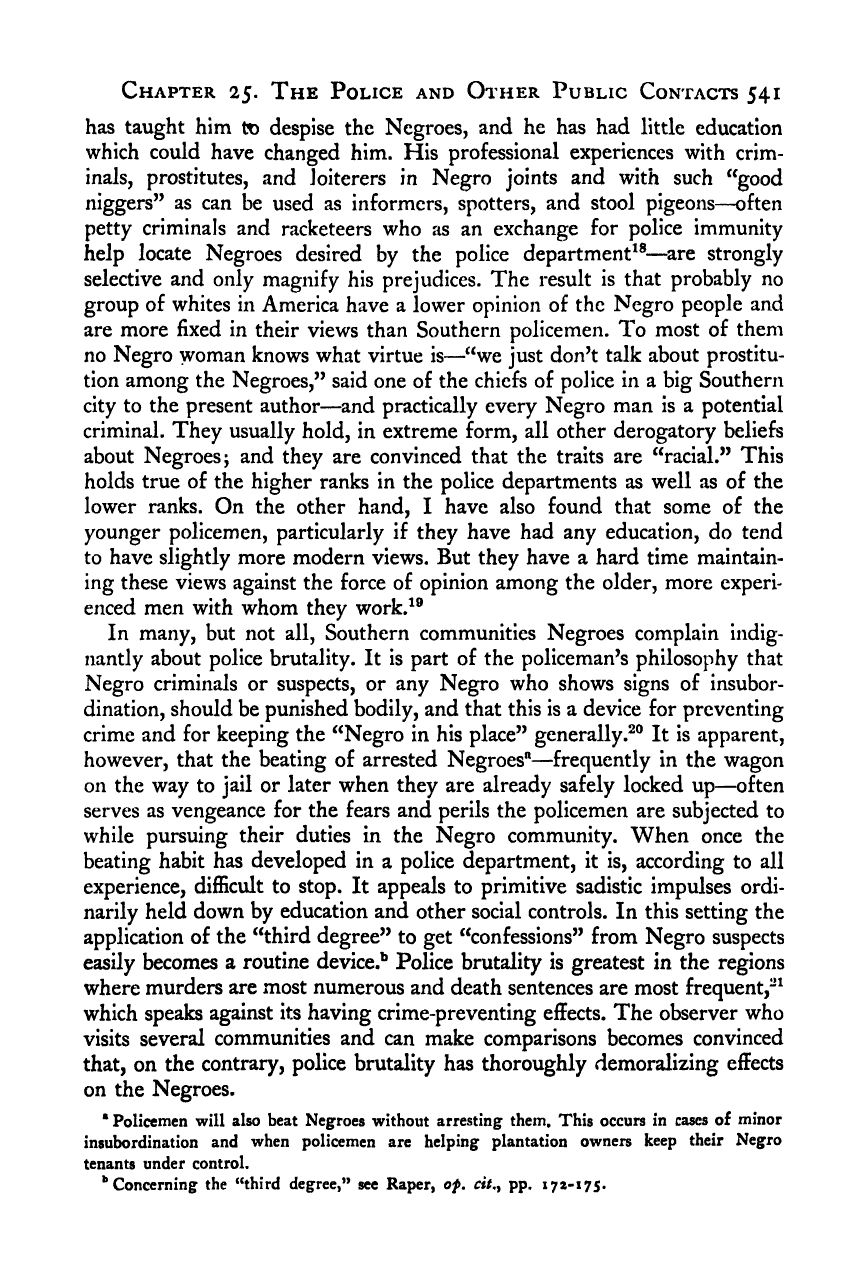Note: Gunnar Myrdal died in 1987, less than 70 years ago. Therefore, this work is protected by copyright, restricting your legal rights to reproduce it. However, you are welcome to view it on screen, as you do now. Read more about copyright.
Full resolution (TIFF) - On this page / på denna sida - VI. Justice - 25. The Police and Other Public Contacts - 3. The Policeman in the Negro Neighborhood

<< prev. page << föreg. sida << >> nästa sida >> next page >>
Below is the raw OCR text
from the above scanned image.
Do you see an error? Proofread the page now!
Här nedan syns maskintolkade texten från faksimilbilden ovan.
Ser du något fel? Korrekturläs sidan nu!
This page has never been proofread. / Denna sida har aldrig korrekturlästs.
Chapter 25. The Police and Other Public Contacts 541
has taught him to despise the Negroes, and he has had little education
which could have changed him. His professional experiences with crim-
inals, prostitutes, and loiterers in Negro joints and with such ^^good
niggers” as can be used as informers, spotters, and stool pigeons—often
petty criminals and racketeers who as an exchange for police immunity
help locate Negroes desired by the police department^®—are strongly
selective and only magnify his prejudices. The result is that probably no
group of whites in America have a lower opinion of the Negro people and
are more fixed in their views than Southern policemen. To most of them
no Negro woman knows what virtue is
—^Ve just don’t talk about prostitu-
tion among the Negroes,” said one of the chiefs of police in a big Southern
city to the present author—and practically every Negro man is a potential
criminal. They usually hold, in extreme form, all other derogatory beliefs
about Negroes; and they are convinced that the traits are “racial.” This
holds true of the higher ranks in the police departments as well as of the
lower ranks. On the other hand, I have also found that some of the
younger policemen, particularly if they have had any education, do tend
to have slightly more modern views. But they have a hard time maintain-
ing these views against the force of opinion among the older, more experi-
enced men with whom they work.^®
In many, but not all. Southern communities Negroes complain indig-
nantly about police brutality. It is part of the policeman’s philosophy that
Negro criminals or suspects, or any Negro who shows signs of insubor-
dination, should be punished bodily, and that this is a device for preventing
crime and for keeping the “Negro in his place” generally.^® It is apparent,
however, that the beating of arrested Negroes”—frequently in the wagon
on the way to jail or later when they are already safely locked up—often
serves as vengeance for the fears and perils the policemen are subjected to
while pursuing their duties in the Negro community. When once the
beating habit has developed in a police department, it is, according to all
experience, difficult to stop. It appeals to primitive sadistic impulses ordi-
narily held down by education and other social controls. In this setting the
application of the “third degree” to get “confessions” from Negro suspects
easily becomes a routine device.** Police brutality is greatest in the regions
where murders are most numerous and death sentences are most frequent,-*
which speaks against its having crime-preventing effects. The observer who
visits several communities and can make comparisons becomes convinced
that, on the contrary, police brutality has thoroughly demoralizing effects
on the Negroes.
* Policemen will also beat Negroes without arresting them. This occurs in cases of minor
insubordination and when policemen are helping plantation owners keep their Negro
tenants under control.
” Concerning the “third degree,” see Raper, of, cit,y pp. 172-175.
<< prev. page << föreg. sida << >> nästa sida >> next page >>